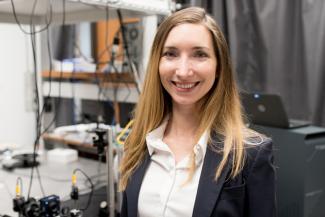
Prof. Jean Anne Incorvia of Texas ECE along with Prof. Supriyo Bandyopadhyay of Virginia Commonwealth University have received a National Science Foundation (NSF) Grant to study and demonstrate a system that will greatly reduce the hardware burden associated with generating correlations between two or more p-bit streams.
Abstract:
Probabilistic computing is a computing paradigm that can solve certain problems more efficiently than traditional digital computing. While digital computing deals with deterministic binary bits that are either 0 or 1, probabilistic computing deals with probabilistic (p-) bits that are sometimes 0 and sometimes 1. This is distinct from quantum computing that deals with quantum (qu-) bits which are a superposition of 0 and 1 (and hence a mixture of both 0 and 1 all the time). Quantum computing is more powerful than probabilistic computing, which, in turn, is more powerful than traditional digital computing in many applications. However, quantum computing usually requires the most hardware resources and digital computing the least, with probabilistic computing in-between the two. Most of the hardware resources in probabilistic computing is expended in generating specific correlations between two or more p-bit streams. In this project, we will study and demonstrate a system that will greatly reduce the hardware burden associated with generating correlations. This will be done by using electrically-generated strain between nano-magnetic patterned thin film devices. The results will make probabilistic computing much more efficient than it currently is. The project will educate K-12, undergraduate, and graduate students in this field to increase the pool of skilled scientists and engineers while advancing the field of computing.
One of the major challenges in probabilistic computing is the complex hardware needed to generate required correlations between probabilistic (p-) bit streams. This hardware usually consists of microcontrollers, analog-to-digital converters, shift registers, etc. that consume too much power and vastly expand the system’s footprint on a chip. In this project, we will study and demonstrate an ultra-compact and extremely energy-efficient correlator or anti-correlator that can generate tunable degrees of anti-correlation between two p-bit streams. It is implemented with two magnetic tunnel junctions (MTJs) whose soft layers are in close proximity and hence dipole-coupled. Bit states are encoded in the resistance states (high or low) of the MTJs. One MTJ generates a p-bit when driven by a spin-polarized current delivering a spin-transfer-torque. The current sets the resistance state high or low with a probability determined by its magnitude, while the bit state of the other MTJ is determined by dipole coupling with the first. Very strong dipole coupling will result in perfect anti-correlation, while very weak dipole coupling will result in no correlation. We will control the effect of dipole coupling by applying (electrically generated) local strain to the second MTJ, which modulates its internal energy barrier, thereby modulating the degree of anti-correlation between the p-bits from 0% to 100%. This project will result in new understanding and devices that use emerging nanomagnetic physics for the next generation of computing.
Jean Anne Incorvia is an Assistant Professor in the Department of Electrical and Computer Engineering at The University of Texas at Austin. Dr. Incorvia is focused on developing practical nano devices for the future of computing using emerging physics and materials. This has included research in fabricating spintronic logic devices and circuits, new types of magnetic memory using spin orbit torque effects, the intersection of 2D materials and spintronics, and using low-dimensional materials for interconnects and transistors.
Supriyo Bandyopadhyay is Commonwealth Professor of Electrical and Computer Engineering at Virginia Commonwealth University. Prof. Bandyopadhyay has authored and co-authored over 400 research publications and presented over 150 invited or keynote talks at conferences and colloquia/seminars across four continents. He is the author of three popular textbooks, including the only English language textbook on spintronics.
